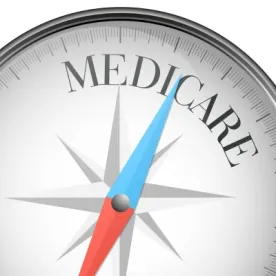On April 9 and 10, 2020, the Centers for Medicare and Medicaid Services (CMS) updated and revised their COVID-19 Frequently Asked Questions (FAQs) on Medicare Fee-for-Service (FFS) Billing. The updates were intended to bring the FAQs up do date in light of new section 1135 waivers, provisions from the Coronavirus Aid, Relief, and Economic Security (CARES) Act and the interim final rule for Medicare and Medicaid Programs; Policy and Regulatory Revisions in Response to the COVID-19 Public Health Emergency. The extensive new FAQs are marked in the document as “New: 4/9/20” and “New: 4/10/20” and provide useful insight for billing various types of services, including telehealth, outpatient hospital services, physician services and ACO payment issues. A selection of the FAQs is outlined below; however, these are non-inclusive and providers would be well advised to review the updated CMS FAQ document in full.
Hospital Services
Question: During the COVID-19 Public Health Emergency (PHE), can a hospital provide outpatient services at a site (temporary expansion site) not considered part of the hospital or even of an existing healthcare facility for patients who are not critically ill?
Answer: During the COVID-19 PHE, CMS is allowing hospitals to provide hospital outpatient services in temporary expansion sites, which may include ambulatory surgical centers, gymnasiums or other sites, by making such sites provider-based to the hospital. CMS has waived the provider-based requirements at 413.65 to facilitate seamless expansion, as may be needed to address the clinical needs that arise as result of the PHE. Hospitals and any of its provider-based departments, including the temporary expansion provider-based departments, must meet the hospital Conditions of Participation that have not been waived.
Excepted provider-based departments, including those that temporarily relocate solely for the purpose of addressing clinical needs related to the COVID-19 pandemic, may continue billing with modifier “PO” while non-excepted provider-based departments should bill with modifier “PN.”
Question: Can an acute care hospital repurpose areas of the hospital that are not currently used for patient care (e.g., a cafeteria) as patient care areas, or existing areas that are used for patient care (e.g., outpatient beds) as higher level care areas (e.g., inpatient acute care beds) during the PHE?
Answer: CMS is providing needed flexibility to hospitals to ensure they have the ability to expand capacity and to treat patients during the COVID-19 PHE. As part of the CMS Hospital Without Walls initiative, for the duration of the COVID-19 PHE, hospitals can repurpose existing clinical (e.g., outpatient beds) and non-clinical space (e.g., cafeterias) for use as acute inpatient patient care areas to help address the urgent need to increase capacity.
Medicare Telehealth
Question: What services can be provided by telehealth during a waiver for the PHE declared by the Secretary under the section 1135 waiver authority?
Answer: Medicare telehealth services include many services that are normally furnished in-person. CMS maintains a list of services that may be furnished via Medicare telehealth. This list is available here. These services are described by HCPCS codes and paid under the Physician Fee Schedule. Under the emergency declaration and waivers, these services may be provided to patients by physicians and certain non-physician practitioners regardless of the patient’s location. Medicare also pays for certain other services that are commonly furnished remotely using telecommunications technology, but are not considered Medicare telehealth services. These services can always be provided to patients wherever they are located, and include physician interpretation of diagnostic tests, care management services, and virtual check-ins. Page 23 of the FAQs also contains a table of payment rates for the virtual check-in and the e-Visit.
Physician Services
Question: What does the interim final rule change for physician and practitioner billing?
Answer: CMS is revising certain Medicare regulations to ensure that sufficient health care items and services are available to meet the needs of individuals enrolled in the Medicare program during the PHE. To that end, the interim final rule makes temporary changes to certain policies regarding:
-
- Supervision by a physician or non-physician practitioner
- Payment for certain services furnished by teaching physicians and moonlighting residents
- Telehealth and other communication technology-based services
- Services furnished by Rural Health Clinics (RHCs) and Federally Qualified Health Centers (FQHCs)
- Payment to laboratories for specimen collection
Question: What are the changes to supervision?
Answer: In general, CMS is revising the definition of direct supervision to include, during the PHE, a virtual presence through the use of interactive telecommunications technology, for services paid under the Physician Fee Schedule as well as for hospital outpatient services. The revised definition of direct supervision also applies to pulmonary, cardiac, and intensive cardiac rehabilitation services during the PHE. Additionally, CMS changed the supervision requirements from direct supervision to general supervision, and to allow general supervision throughout hospital outpatient non-surgical extended duration therapeutic services.
Accountable Care Organizations
Question: What happens if an Accountable Care Organization (ACO) or its participants do not report the Quality or Promoting Interoperability categories to the Merit-based Incentive Payment System (MIPS), and what happens if they do?
Answer: For MIPS eligible clinicians (ECs) who participate in Shared Savings Program ACOs, if the ACO does not completely report quality AND no ACO participant or MIPS EC in the ACO reports promoting interoperability (PI) due to extreme and uncontrollable circumstances, then the ACO will be eligible to have those two categories reweighted to zero percent, and the cost performance category will continue to be weighted at zero percent under the Alternative Payment Model (APM) scoring standard.
Payment for Specimen Collection for Purposes of COVID-19 Testing
Question: What changes did CMS announce regarding specimen collection fees for COVID19 testing?
Answer: CMS changed the Medicare payment rules to provide payment to independent laboratories for specimen collection from beneficiaries who are homebound or inpatients not in a hospital for COVID19 testing under certain circumstances
Question: Who can bill for the Medicare specimen collection fee?
Answer: Independent laboratories can bill Medicare through their MAC for the specimen collection fee. The specimen collection fee applies if the specimen is collected by trained laboratory personnel from a homebound or non-hospital inpatient and the specimen is a type that would not require only the services of a messenger pick up service. However, the specimen collection fee is not available for tests where a patient collects his or her own specimen.
Question: What is the definition of homebound for purposes of our specimen collection policy?
Answer: A patient is homebound for COVID-19 purposes if (1) a physician has determined that it is medically contraindicated for a beneficiary to leave the home because he or she has a confirmed or suspected diagnosis of COVID-19; or (2) a physician has determined that it is medically contraindicated for a beneficiary to leave the home because the patient has a condition that may make the patient more susceptible to contracting COVID-19.
Diagnostic Laboratory Services
Question: Are there Healthcare Common Procedure Coding System (HCPCS) and Current Procedural Terminology (CPT) codes available for COVID-19 laboratory testing?
Answer: CMS has created two HCPCS codes in response to the urgent need to bill for these services. The codes are:
-
- U0001, CDC 2019-nCoV Real-Time RT-PCR Diagnostic Panel and
- U0002, 2019-nCoV Coronavirus, SARS-CoV-2/2019-nCoV (COVID-19), any technique, multiple types or subtypes (includes all targets), non-CDC.
Additionally, the American Medical Association (AMA) Current Procedural Terminology (CPT) Editorial Panel has created CPT code 87635 (Infectious agent detection by nucleic acid (DNA or RNA); severe acute respiratory syndrome coronavirus 2 (SARS-CoV-2) (Coronavirus disease [COVID-19]), amplified probe technique)
Laboratories can begin billing for the performance of these tests using these codes immediately via standard Fee-for-service billing practices.
Cost Reporting
Question: Will CMS delay the filing deadline for cost reports impacted during the COVID-19 PHE?
Answer: Yes, 42 CFR 413.24 (f)(2)(ii) allows this flexibility. CMS will delay the filing deadline of Fiscal Year End (FYE) 10/31/2019 and FYE 11/30/2019 cost reports until June 30, 2020. CMS will also delay the filing deadline of the FYE 12/31/2019 cost reports until July 31, 2020.
Skilled Nursing Facility Services
Question: Does the section 1812(f) waiver for the 3-day qualifying hospital stay apply only to those beneficiaries who are actually diagnosed with COVID-19, or does the waiver apply to all SNF-level beneficiaries under Medicare Part A?
Answer: The qualifying hospital stay waiver applies to all SNF-level beneficiaries under Medicare Part A, regardless of whether the care the beneficiary requires has a direct relationship to COVID-19.
General Billing Requirements
Question: Regarding the use of the condition code “DR” and modifier “CR”, should these codes be used for all billing situations relating to COVID-19 waivers?
Answer: Yes. Use of the “DR” condition code and “CR” modifier are mandatory for institutional and non-institutional providers in billing situations related to COVID-19 for any claim for which Medicare payment is conditioned on the presence of a “formal waiver” (as defined in the CMS Internet Only Manual, Publication 100-04, Chapter 38, § 10). The DR condition code is used by institutional providers only, at the claim level, when all of the services/items billed on the claim are related to a COVID-19 waiver. The CR modifier is used by both institutional and non-institutional providers to identify Part B line item services/items that are related to a COVID-19 waiver.
The FAQs are a useful resource given the speed of regulatory developments during the COVID-19 pandemic. CMS has indicated its intention to continuously update the FAQs as the situation develops. Frequently reviewing the FAQs will help providers and facilities keep abreast of changes to the FFS billing requirements.
This post was co-authored by Michael Lisitano, legal intern at Robinson+Cole. Michael is not yet admitted to practice law.



 />i
/>i

